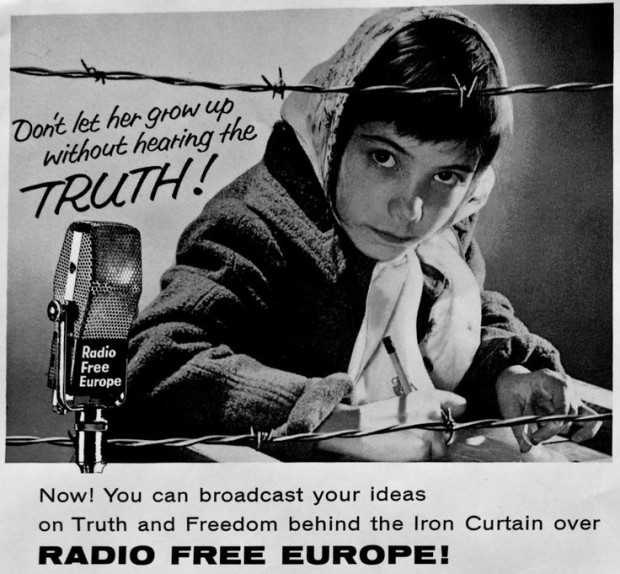Many thanks to SWLing Post contributor, Andrea Borgnino, who shares the following article from the website Journalism Is Not A Crime:
From Propaganda to Journalism: How Radio Free Europe Pierced the Iron Curtain
The end of the Second World War signaled the beginning of an information war in Europe. As the military alliance between the Soviet Union and its main western allies — the United States and Britain — came to an end, the USSR backed small communist parties that asserted ever-tighter control over much of Eastern Europe.
Speaking in Fulton, Missouri in March 1946, former British Prime Minister Winston Churchill warned of an “Iron Curtain” of totalitarian control sealing off half the continent. His speech heralded the beginning of an ideological “cold war” that would last for more than 40 years, a struggle in which citizens of the eastern camp were only meant to hear one side of the argument.
“We talk about the Iron Curtain as a physical barrier, but it was also an information curtain,” says A. Ross Johnson, a former director of Radio Free Europe and author of a history of RFE and its companion station, Radio Liberty, which broadcast into the Soviet Union. “All the communist regimes saw control of information as a key to their rule.”
An SWLing Post contributor also recently shared the following PDF article by A. Ross Johnson for the Wilson Center. Here’s the summary:
To Monitor and be Monitored– Radio Free Europe and Radio Liberty during the Cold War
Monitoring of Soviet bloc radios was an important input to Radio Free and Radio Liberty broadcasts during the Cold War. RFE and RL also monitored the official print media and interviewed refugees and travelers. Soviet bloc officials in turn monitored RFE, RL, and other Western broadcasts (while jamming their transmissions) to inform themselves and to counter what they viewed as “ideological subversion.” On both sides, monitoring informed media policy.
RFE and RL monitored their radio audiences through listener letters and extensive travel
surveys, while the Communist authorities monitored those audiences through secret police
informants and secret internal polling. Both approaches were second-best efforts at survey
research but in retrospect provided reasonably accurate indicators of the audience for RFE, RL, and other Western broadcasters.
Click here to download the full Wilson Center article as a PDF.
If you’re interested in Cold War broadcasting, I would also encourage you to check out Richard Cummings’ blog, Cold War Radio Vignettes.

